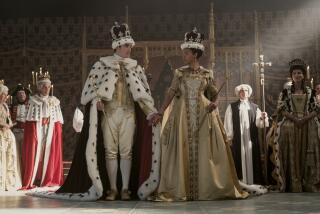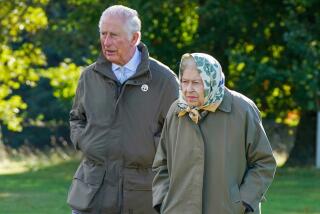The Political and Family Saga of ‘The Churchills’
- Share via
She was born in May 1943 during a German air raid over London, in an apartment overlooking both houses of Parliament. It was to this apartment that her grandfather, Winston Churchill, the great World War II prime minister, would repair two years later after his stunning defeat at the polls, just two months after victory in Europe.
The dramatic circumstance of Celia Sandys’ birth is not mentioned in the new 2 1/2-hour documentary, “The Churchills,” airing on PBS tonight. That’s hardly surprising. There’s already drama aplenty in the political and family saga of the cigar-chomping leader who led Britain during its “finest hour,” was defeated and came back to office again.
Sandys (pronounced Sands)--author of “The Young Churchill,” a recent biography based on previously unpublished letters her grandfather wrote when he was in college, and an interviewee on “The Churchills”--makes light of her arrival during a bombing. As she says, her mother, Diana, the eldest daughter of Winston and Clementine Churchill, was “an air raid warden anyway, so I don’t suppose she was afraid.”
Co-produced by WGBH-TV in Boston and Brook Associates Inc. in London, the documentary spans two centuries and three generations. As if it were dynastic soap, WGBH describes “The Churchills”--in “the tradition” of “The Windsors: A Royal Family” (1994) and “The Kennedys” (1992)--as “a story of political and romantic ambition, honor and scandal, love and war.”
That description might rather have pleased Churchill himself, who, as his private secretary, Anthony Montague Browne, says in the program, subscribed to the notion of a “great man theory of history”--that there is no history, only biography.
“Some of it,” Sandys says of the documentary, “is very moving, and some is very close to the bone. It’s not comfortable to sit and see your aunt [Sarah, an actress] portrayed as an alcoholic--and your uncle [Randolph]. . . . I quite accepted that these were facts [but] this isn’t a show the family had put on. It’s a show the family participated in.”
They did so, she readily agrees, for the sake of history.
The program does note toward the end that Diana Sandys committed suicide in 1963. On that, Celia Sandys says she might have wished a bit more. Her mother “took an overdose. I think she was unhappy. Her marriage had broken up a few years before.” Churchill died 15 months later at age 90.
“They [‘The Churchills’ producers] decided to interview me,” explains Sandys, “because having done this book, I made myself the authority on the first 20 years of my grandfather’s life.”
A late bloomer in writing, Sandys is a mother of four (by three marriages) who has worked in real estate, interior decorating and public relations. She says that when she took a look at Churchill’s letters at Cambridge, she was “fascinated by the visual quality of them, [and] was so amazed that no one had done [a book based on them] that I thought I had better put my name on it directly before someone else did.”
Besides Sandys, who resembles grandmother Clementine, other fourth-generation Churchills in the TV production are cousins Winston Churchill, a member of Parliament (son of Randolph Churchill and Pamela Harriman, now the U.S. Ambassador to France), and his half-sister Arabella Churchill (Randolph’s daughter by his second wife), whose face is a mirror portrait of her grandfather’s.
The centerpiece of this dynastic saga, of course, is Churchill. Descendant of the first Duke of Marlborough (1650-1722), about whom he wrote a four-volume biography--years later in 1953, his six-volume history of World War II won him the Nobel Prize for literature--Churchill was born into the cloistered world of British aristocracy and into a family perennially in debt.
His father, Lord Randolph Churchill, second son of the seventh Duke of Marlborough, rose to become chancellor of the exchequer, and died, it’s generally believed, of syphilis, when Winston was 20. Sandys says she would have preferred that the documentary had given weight to the theory that her great-grandfather actually died of a brain tumor.
Churchill’s mother was the dark-eyed, American-born beauty Jennie Jerome.
Tragedy and scandal marked the lives of Churchill’s children. The couple lost a 3-year-old daughter, Marigold, in 1921. Of the five, only Lady Mary Soames survives, an elegant, silver-haired woman in her 70s. She is a prominent participant in “The Churchills.”
Sandys views her grandfather’s childhood dispassionately. He was “an impossible child in some ways,” she says in the documentary. If he were her child, “I think I would have adored him . . . but if he was my child’s best friend, I would have been fairly hesitant about asking him to come and stay for the holidays.”
From her perspective, he had great tenacity. “Although he was born to enormous privilege,” she later explains, “he wasn’t a very promising child to start with. He was born prematurely. He was sickly. He had a speech impediment. He didn’t demonstrate either sporting prowess or academic genius. . . . He didn’t have any friends.”
Yet, Sandys notes, he was “courageous, and had a sense of humor which comes through in his letters. [And] he never gave in. Right through his life.”
As for what made him a leader, she says: “I think he had a powerful mixture of genes from Jennie Jerome--the combination of the settler blood and the [American] Indian blood, and then this ancestry coming down from the first Duke of Marlborough. . . . And clearly young Winston was brought up with a sense of history.”
* “The Churchills” airs at 8 tonight on KCET-TV Channel 28.
More to Read
The complete guide to home viewing
Get Screen Gab for everything about the TV shows and streaming movies everyone’s talking about.
You may occasionally receive promotional content from the Los Angeles Times.






